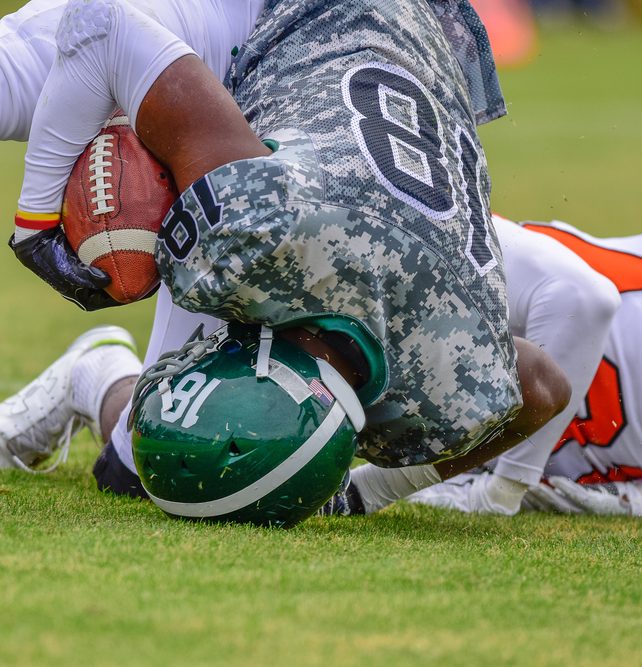People of all ages enjoy sports of all kinds, finding unity and community within the team. But for all the good things sports offer, players and participants are subject to serious risks and injuries that can change the course of their lives.
Safety practices and procedures can help mitigate the risks, but injuries still happen. If you or your loved one have been injured while playing a sport, and the injury was due to another person's negligence, you may be entitled to compensation.
Contact Us Today to Schedule
A Free Consultation
Sports are fun to play when done safely and responsibly. Choosing to engage in a sport—even one with higher risks—does not disqualify you from seeking compensation if you are injured due to someone’s negligence or malicious intent. At Regan Zambri Long, our team of sports injury lawyers is ready to go to bat on your behalf. Our sports-related personal injury attorneys practice in Maryland, Virginia, and Washington, DC.
We’ve recovered millions of dollars on behalf of clients who suffered injuries while engaged in a sport, and we can do the same for you. Our compassionate team has decades of experience and is regularly recognized locally and nationally as top-tier lawyers. With Regan Zambri Long, you get the small firm’s personal attention and the large firm’s experience and budget. We work on a contingency basis, meaning we don’t collect any fees until we’ve won a recovery in your favor.
Schedule your free case evaluation by calling 202-960-4596 and get started on your road to full recovery.

Thirty million kids participate in some form of organized sports in the United States, resulting in more than 3.5 million injuries each year. Nearly one-third of childhood injuries are sports-related, ranging from mild strains and sprains to severe muscle, brain, and spine injuries. No sports injury should ever be written off or ignored, though not every injury is of the same severity and seriousness. Severe injuries are not as common, but they can have lasting effects that change the way you or your loved one can engage with life. Many sporting injuries are preventable and caused by negligence. When negligence is at the root of your injury, you are entitled to compensation.
Concussions are rampant among players of many different sports, with annual counts estimated anywhere between 1.6 and 3.8 million reported concussions resulting from sports or recreational activities. A concussion is a mild form of traumatic brain injury, and though one mild concussion may be easy to recover from, severe concussions or frequent concussions can cause serious issues in the future.
Contact sports come to mind immediately when thinking about sports-related injuries. And while contact sports certainly lead to many injuries, other sports and recreational activities that lead to injuries might be surprising.
Perhaps one of the most notorious offenders, football is a full-contact sport that can lead to many injuries, including:
A Journal of the American Medical Association study found evidence to suggest that American football players may have an increased risk for chronic traumatic encephalopathy (CTE). CTE is brain degeneration likely caused by repeated head traumas, including concussions. Football and other full-contact sports are at the top of the list for frequent and repeated concussions.
Another full-contact sport, hockey can be brutal to players. Common injuries include concussions, broken bones (particularly the collar bone), ACL strains and tears, and shoulder dislocation.
Like football, hockey can be known for an aggressive defense, but a dedicated defense isn’t an excuse for excessive and aggressive force from players. Players who play too aggressively might be liable for the injuries they cause.
Though many people might think of swimming as a low-impact workout, competitive swimmers are at risk for several neck and shoulder injuries. These injuries include:
Poor stroke or breathing techniques can contribute to swimming injuries, as well as over-training and not getting enough rest.
In reality, any sport can lead to injury, regardless of skill level and experience. Though you may take every precaution to protect yourself or your loved one, accidents still happen and many of them are caused by negligence. Regan Zambri Long’s sports injury lawyers will fight on your behalf to recover the compensation you deserve so that you can focus on healing.
While some sports may be known for specific injuries, many injuries can occur from many different sports and recreational activities, even a golf cart accident can be serious.
Injuries are often divided into two categories: acute and chronic. Acute injuries generally happen when contact causes an injury—a player falls, collides with another player or object, receives a blow, or twists wrong. Common acute injuries include:
Chronic injuries develop gradually with repeated overuse. Some chronic injuries can include:
Traumatic brain injuries (including concussions) are a significant cause of concern for athletes in all fields. The long-term effects of severe or repeat TBIs may not manifest until a later date. You must seek medical attention for you or your loved one as soon as a sports injury occurs and follow the doctor’s instructions.
You may also want to take advantage of a free case evaluation with an experienced sports injury attorney. Statutes of limitations for personal injury cases vary depending on the jurisdiction. Maryland and Washington, DC, allow three years to file a personal injury claim. Virginia allows two years to file. Missing the window for filing may exclude you from claiming compensation, so it’s best to explore your options early.
A catastrophic injury has significant, lasting effects. While many common sports injuries are minor, others can be life-changing and warrant rigorous pursuit of compensation.
Common catastrophic sports injuries include spinal cord injuries, brain bleeds, skull fractures, sudden cardiac arrest, and internal organ injuries.
The National Center for Catastrophic Sport Injury Research defines a catastrophic injury as a fatality, injury that results in permanent functional disability, or a serious injury with a temporary functional disability but full recovery.
An athlete who suffers catastrophic injuries might recover, but still face the end of his or her career.
Catastrophic sports injuries can be accidental but they can also result from negligence, most commonly from athletes returning to practice or play before fully healing from an initial injury.
Whether you or your loved one suffered an initially catastrophic sports injury or a minor injury that was disregarded, you are entitled to compensation. Coaches and the people who oversee the team have a responsibility to do all they can to protect their players, and when they fail to do that, they must be held responsible.

Suing for a sports-related injury can be challenging. Whenever you engage in a sport or recreational activity, you assume the risks associated with it, whether casually or formally through a waiver or agreement. This means that injuries occurring during the normal course of a game or practice are unlikely to warrant compensation. To sue for an injury sustained from a sport, you will need to show either negligence or an intent to harm.
A football player who sustains a concussion during normal and valid play won’t have success suing because the injury is within the realm of expectation for the sport. However, if the player suffered a concussion that was intentionally caused by another player, the injured player would have grounds to pursue a personal injury case.
Likewise, if a player’s injury was the result of negligence, he or she will have grounds to sue. Examples of negligence could include:
Team coaches and management have a responsibility to protect their players. From little league to professional sports, players must be valued higher than a win. If you or your loved one suffered injury or further injury because of the negligence of others, you should consult with the experienced sports injury attorneys at Regan Zambri Long for a free case evaluation.
Liability waivers are common when engaging in potentially risky sports or recreational activities. In general, they protect the leading party from being sued for the risks that the participant assumes by agreeing to participate. However, some liable parties might try to use a liability waiver to discourage a valid suit for negligence.
If you or your loved one was injured and you signed a liability waiver beforehand, you should bring a copy of the waiver to your free case evaluation. The experienced sports injury attorneys at Regan Zambri Long will review the details of your situation and help you determine whether your injuries were the result of assumed risks or negligence.
A liability waiver may protect against ordinary negligence—the failure to act in a reasonably safe way. However, gross negligence is a conscious violation of another person’s right to safety, and gross negligence often isn’t covered by a liability waiver.
The sports injury lawyers at Regan Zambri Long PLLC will help you investigate and navigate your sports-related personal injury claim and pursue all the compensation you deserve. Just because sports are inherently risky does not mean that coaches, players, or managers are off the hook for their choices and behaviors.